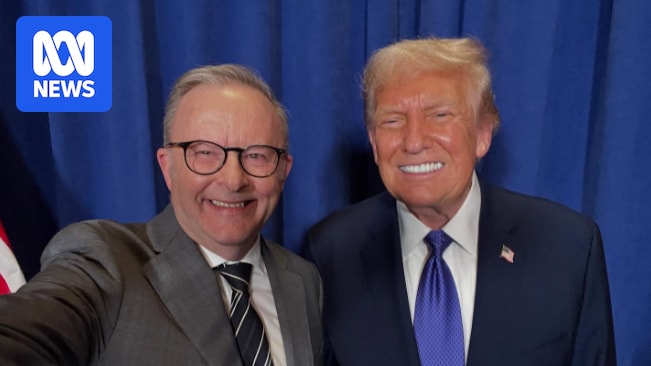
When Anthony Albanese steps into the Oval Office for what could be the most significant meeting of his prime ministership, he will carry a strategic advantage that Donald Trump is keenly interested in. The timing of this meeting could not be more fortuitous for Albanese.
Just over a week ago, China intensified its control over the global supply of critical elements used in manufacturing everything from batteries and cars to missiles and magnets—resources that Trump has frequently highlighted. Australia possesses these critical minerals and rare earths in abundance, yet lacks the capital to process them, which is essential to challenge China’s dominance in this sector.
Strategic Minerals: A New Diplomatic Currency
According to sources, Beijing’s market manipulation has made the global playing field “unplayable,” a challenge Western governments are now compelled to address financially. Trump is paying attention, and Albanese has a plan, as noted by Joe Hockey, former Australian ambassador to the US during Trump’s first term.
“If [Albanese] is just coming with baubles and trinkets, it won’t wash with Trump,” Hockey told the ABC. “He wants substantive wins for Americans.”
Hockey emphasized the importance of first impressions, noting that every meeting between a US president and an Australian prime minister is crucial. Trump will likely use the talks to assess Albanese’s character and intentions. Australia’s strong reputation among Republicans, who value the depth of the alliance, may work in Albanese’s favor.
“Trump enjoys a bit of humor… he’ll respect you for being strong and respectful,” Hockey added.
Albanese’s Agenda: Minerals and Military Alliances
The meeting, which has been in the works for eleven months, offers Albanese a chance to establish a meaningful personal rapport with Trump. The transactional nature of Trump’s presidency and his America-first agenda have prompted concerns about the longevity of the US-Australia alliance. Disagreements over trade tariffs, climate policies, and defense spending have strained relations, making the offer of critical minerals a potentially decisive factor.
Albanese, accompanied by Resources Minister Madeleine King and Industry Minister Tim Ayres, will propose guarantees for a reliable supply of critical minerals to the US. Options include US investment in Australia’s $1.2 billion critical minerals reserve or financing Australian projects and companies.
US Treasury Secretary Scott Bessent criticized China’s decision to restrict rare earths, stating, “This is China versus the world,” and pledged a “fulsome response” from the US and allies, including Australia.
While Australia is cautious about joining a US-led push against its largest trading partner, the increased interest in critical minerals presents an opportunity for Albanese to capitalize on during his meeting with Trump.
AUKUS and Defense Spending: Key Discussion Points
Arthur Sinodinos, another former Australian ambassador to the US, stressed the importance of securing Trump’s support for the $368 billion AUKUS submarine pact. “It’s important for the prime minister to eyeball the president about this,” Sinodinos said, emphasizing the need for a personal rapport and a clear understanding of shared interests.
The Pentagon is reviewing the agreement for Australia to acquire eight nuclear-powered submarines. While Australian officials remain optimistic, the outcome may be influenced by Trump’s mood, as noted by Hockey.
Charles Edel, Australia chair for the Centre for Strategic and International Studies, highlighted the opportunity for Albanese to advocate for AUKUS directly to Trump, who has been reticent on the subject publicly.
“If you have leader-level buy-in, that of course shapes any contours of what the review might produce,” Edel said.
Albanese might also propose advancing a $1 billion AUKUS payment due to the US by year’s end, addressing calls for increased Australian defense spending beyond the current two percent of GDP.
“The president has been very consistent in his calls for allies to lift their overall defense spending,” Edel noted, referencing calls for spending to reach 3.5 or even 5 percent of GDP.
Australia’s strategic location and its efforts to strengthen military ties in the Pacific, countering China’s regional influence, are significant assets in discussions with Trump.
Building a Personal Connection
Albanese and Trump are not unfamiliar with each other, having engaged in four phone calls since Trump’s re-election last November, which Albanese described as “warm and constructive.” Their first face-to-face meeting, initially scheduled for June, was postponed due to Trump’s early departure from the G7 Summit to address a Middle Eastern crisis.
Past meetings with Trump have been unpredictable, but recent interactions suggest a more measured approach, as the US recognizes the value of reliable allies like Australia.
“Australia and the United States have stood shoulder-to-shoulder in every major conflict for over a century,” Albanese stated ahead of his visit. “I look forward to a positive and constructive meeting with President Trump at the White House.”
The meeting represents an important opportunity to consolidate and strengthen the Australia-United States relationship, with significant implications for both countries’ strategic and economic futures.





